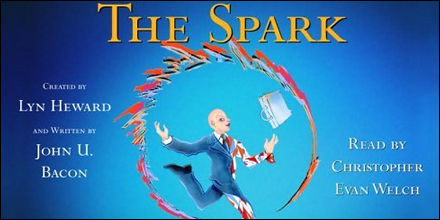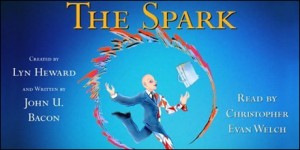In Victor Wooten’s Groove Workshop, and in his book The Music Lesson, he talks a little bit about how a musician, or how any artist for that matter, can get a wealth of new inspiration by applying methodology and techniques gleaned from other areas of artistry. For example, you can watch how a pianist plays the piano with two hands and come up with a similar two-hand tapping technique on your bass. You can listen to how a trumpet player’s breathing affects the way his melodies are phrased and adopt that same melodic approach to your own playing (which is why so many jazz players play what they singing). I’ve learned to adopt certain things I’ve read from books into how I approach the music business, how I market myself in the social media, and how I conduct myself as a musician – both onstage and off. So today I want to talk a little bit about a book that is filled with useful bits of information for not only the circus performer or the working musician, but for anyone that wants to rediscover that creative spark within: it’s Cirque Du Soleil’s The Spark, a book about how to reignite your creative juices in whatever field of work you’re in.
Cirque Du Soleil’s The Spark is a semi-fictional account about a sports agent that is introduced to the workings of Cirque Du Soleil. He becomes intrigued about the company and how creativity thrives in all its areas of operation. You see, as a sports agent he’s become jaded at his job. He does the same thing all the time; he wears the same type of suit every day; he makes the same type of deals all the time. He needs a change. So one day he introduces one of his athletes into the Cirque and in doing so he gets sucked into the energetic environment. He learns how the company works, how the performers come up with their routines, and even learns how to do some of the acts himself – he becomes entrenched in the Cirque life. And all these different people he runs into, i.e. composers, acrobats, coaches, athletes, executives, all have some advice to dole out.
Let me just start out by saying that I agree with what most of the book posits. There are only a couple of parts I had to call Bravo Sierra on, but for the most part I agree with it all. Let’s dig in to some memorable quotes and look at how it can affect you and how it has applied to me as a musician.
“A good show is one where only we know what went wrong.”
I’m always trying to personally pull off my own “perfect” show. By that, I mean, I want whatever is in my brain to be perfectly synched up to my fingers and voice. Sure, there are times when I hit a “wrong” note but for the most part those wrong notes are still going to fall at some place within the key. It might not sound right but it won’t be hugely distracting. There are those moments of complete dumbfuckery where I hit, what I think, is the right note but as it turns out I’m completely on the wrong string. This particularly sounds awful when everyone has to stop on a chord and Wrong String McGillicutty over here is having to quickly correct himself. Things like that are glaringly bad. But they’re rare. For the most part whatever little error you think you did probably went unnoticed by most people.
Things aren’t always going to go perfectly but they should always be compelling. A live show should always capture and keep everyone’s attention. Whatever glitches go on behind the scenes, whatever tuning issues you’re having, whatever stumble threw you off, don’t sweat it and don’t let it affect the rest of the show. The odds are that most people didn’t notice it.
Strive for that perfect performance and aim at being compelling.
In the book they were mainly talking about the snaffoos that happen behind the curtain, i.e. computer problems, wardrobe malfunctions, accidents with power tools. If you work in a technical field you’ll know what they’re talking about. Sometimes you have to wing it. And even though you’re winging it the crowd may never know you’re flying by the seat of your pants. You’ll probably never get a pat on the back. You’ll probably never get noticed for the genius moves you have to do to pull off that type of performance. But keep in mind that it’s because you’re able to work by the seat of your pants that you’ve been hired. This is a quality that is greatly in demand but so few people possess today. Never underestimate the ability to improvise on the fly.
“The trick is, not trying to solve the problem before you’ve figured out what it is.”
Yes, sometimes something will happen and you’ll immediately want to jump in and try to solve the issue. I also work at a planetarium and at a planetarium everything is dependent on computers. As you probably know, when you’re dealing with computers, any number of things can go wrong. And the way this place is set up is like a string of Christmas lights: one thing goes wrong and everything else falls apart behind it. You have to know enough about how things work so you can jump in, recognize the problem, fix it and move on.
In life, if something ever goes wrong you should find out what’s causing the problem before jumping in and mucking up the works further. This goes for relationships, raising kids, computer problems, and world domination.
For musicians this advice can be best used when you’re messing around with recording software. I don’t know how many times something has gone wrong with a machine and I ended up making things worse by trying to quickly solve the issue instead of figuring out exactly what was the problem. God damn computers make my life difficult. And how do you solve problems with technology? More technology probably.
“She said that every accident is just a creative opportunity in disguise.”
I can’t tell you how many amazing things have come out of happy accidents. I remember one time Cea Serin was working on the recording of our song “The Illumination Mask.” We got to the part where we were doing guitar solos. Whenever we record solos I usually keep the solo sections a secret from Keith. Then when it’s time I’ll go to that part of the song and I’ll just have him improvise solos over and over again. We gradually get all the cool elements from these improvised solos and he then plays all those cool pieces as one solo. Well, this one solo in particular went way too long so I hit stop on the recording. We went back and ended up eventually getting the solo but what we didn’t know was the tail end of the solo that was too long was still on tape. We ended up getting these high pitch squeals at the end that sounded really cool. I then got inspired to go into the vocal booth and do these high pitched vocal screams along with his guitar squeals. It ended up really cool.
“The better we get along, the more free we are to let loose and express our ideas and emotions.”
I think I’ve written before about how bad morale can kill a gig and destroy a performance. A while back we had a member in the band that was just the absolute worst. His bad attitude and lack of professionalism not only brought the band down but the audience could tell he was phoning it in.
The same can be said with any type of job. If everyone gets along and if everyone is happy then the entire environment is fertile for creativity to grow.
“True creativity requires collaboration.”
Sorry, I don’t agree. You can’t just make a blanket statement like this. It discounts all the great individual minds of our time. And don’t even start in with any nonsense. If I said Mozart or Einstein are these great independent minds don’t even attempt to say that they wouldn’t be able to come up with their best work if not for the help of their family and friends. That’s not collaboration; it’s nurturing. I’m not going to argue semantics here. Most of the best ideas in literature, music, the world of visual art, etc. have all sprung from an individual’s mind.
Never discount the power of the individual.
“Constraints on time, money, and resources can be incredible motivators! Some of our most inspired ideas have arisen from the most Spartan situations.”
True! There’s nothing like a deadline that will make you push hard. That’s like in school when you waited till the last minute to write that term paper and you push for hours to get it done on time. The focused determination sparks something within you, gets you in the zone, and pumps you up. I’ve found that if you don’t have a deadline you’ll just keep working on stuff a little bit here and a little bit there. Having a deadline forces you to get into the zone. It makes you want to complete a chunk of work in a defined space of time. This forces you to concentrate on one thing, zone in on what has to be done first, and prioritize your time more effectively. I’m a big supporter of deadlines.
“But you also have to deliver. And you can’t deliver without taking risks – individually or as a troupe. It is essential. But you have to learn to take the right risks – risks that will allow you to fulfill your vision.”
“To me, creativity is, first and foremost, all about courage – a willingness to take risks, to try new things, and to share the experience with others.”
“nothing of significance could be accomplished without taking a leap of faith. But first you need vision.”
Yes, I like those quotes about risks and taking chances quite a bit. One thing I’ve never been able to bring myself to do is uproot my life and go move to some place where I would be better appreciated. Why not move to New York, Los Angeles, or Las Vegas? Well, for me, money – and not having a lot of it – has always been an issue for me. But some people take that risk. They pack their car, take whatever money they have, and they do it.
I used to be married to someone that said, “I’m moving to California to be a star.” And god dammit, she moved to California and she became a star. Good for her. She took that leap of faith.
But it’s important to point out the most important aspect of the above quotes: vision. You can’t just take a leap of faith without a vision.
I’ve always said that I can accomplish whatever goal I wanted by coming up with a logical set of steps that will get me there. I start with the end result and I devise a plan to get there. But those steps have to be logical – they have to make sense. I know someone that once thought all you had to do was record a demo, someone would hear it, then you’d get discovered, and then they’d do all the work for you. No, that’s not how it works.
The truth is that you’re probably going to be doing most of the work on everything. No one is going to discover you. No one is going to listen to you. No one is going to see you. None of that is going to happen unless you put yourself out there.
“We do not want to be the stars of the show; we want you to enjoy it.”
This is probably the best advice anyone can take to heart about performing live. It’s not about you getting the spotlight; it’s about the audience enjoying themselves. If you enjoy what you’re doing then the odds are someone else out there is going to enjoy what you’re doing. Sam Raimi had a quote where he said something very similar: “if you think what you’re doing is cool then the odds are someone else out there will think it’s cool, too.”
I believe the most important thing is if you’re doing a live show, if you’re working for a client, if you’re making a movie for someone…whatever it is you’re doing, the number one concern should be whether or not your target audience is going to enjoy it.
Ya got that?
And I’ll let the last little piece of advice from the book close this out. This last bit can be used for failing relationships, getting burned out in your job or any other area in your life. This goes beyond the circus life, beyond the musician’s life, this is just a life quote on its own.
“It’s amazing how much we fear the unknown – even when the unknown carries with it the possibility of success. We are so determined to stick t our comfort zones that we learn to live with disappointment, as long as it’s familiar and safe. This was the lesson, I knew this training session was all about. our fears hold us back, make us fall short of our goals. Only by taking risks can we hope to accomplish the extraordinary.”





